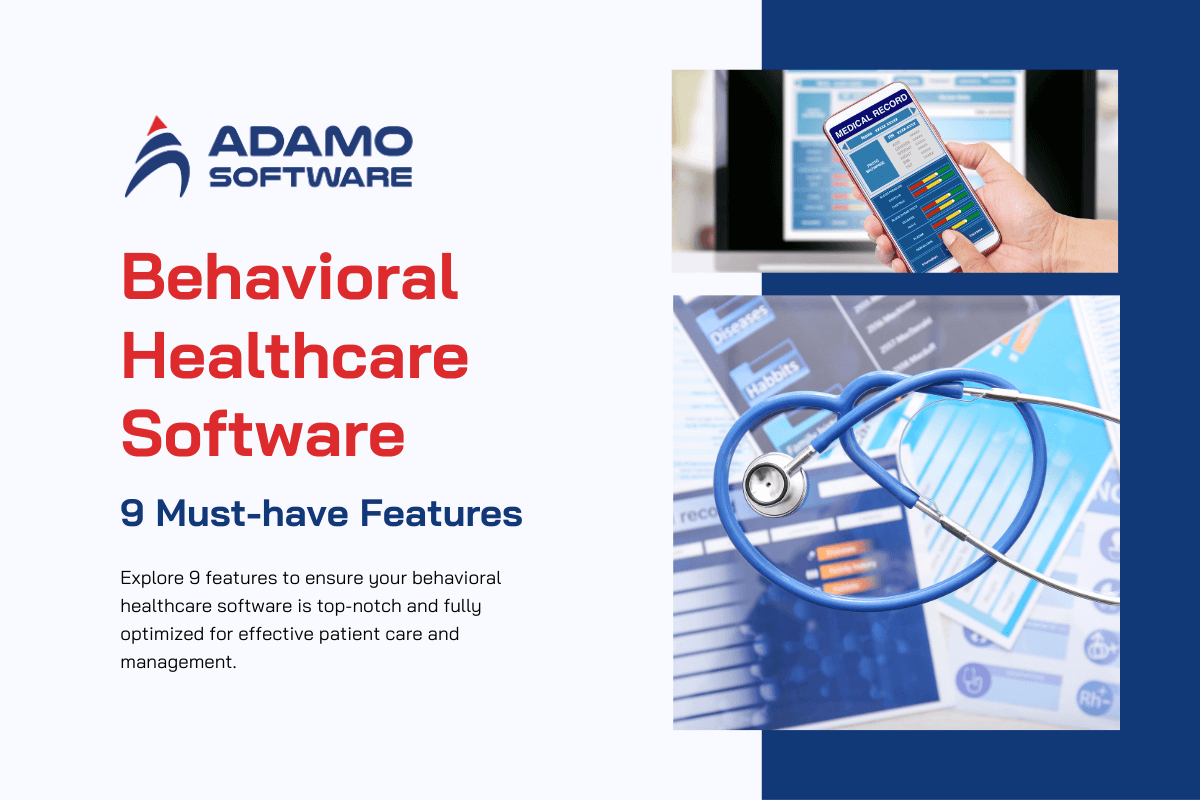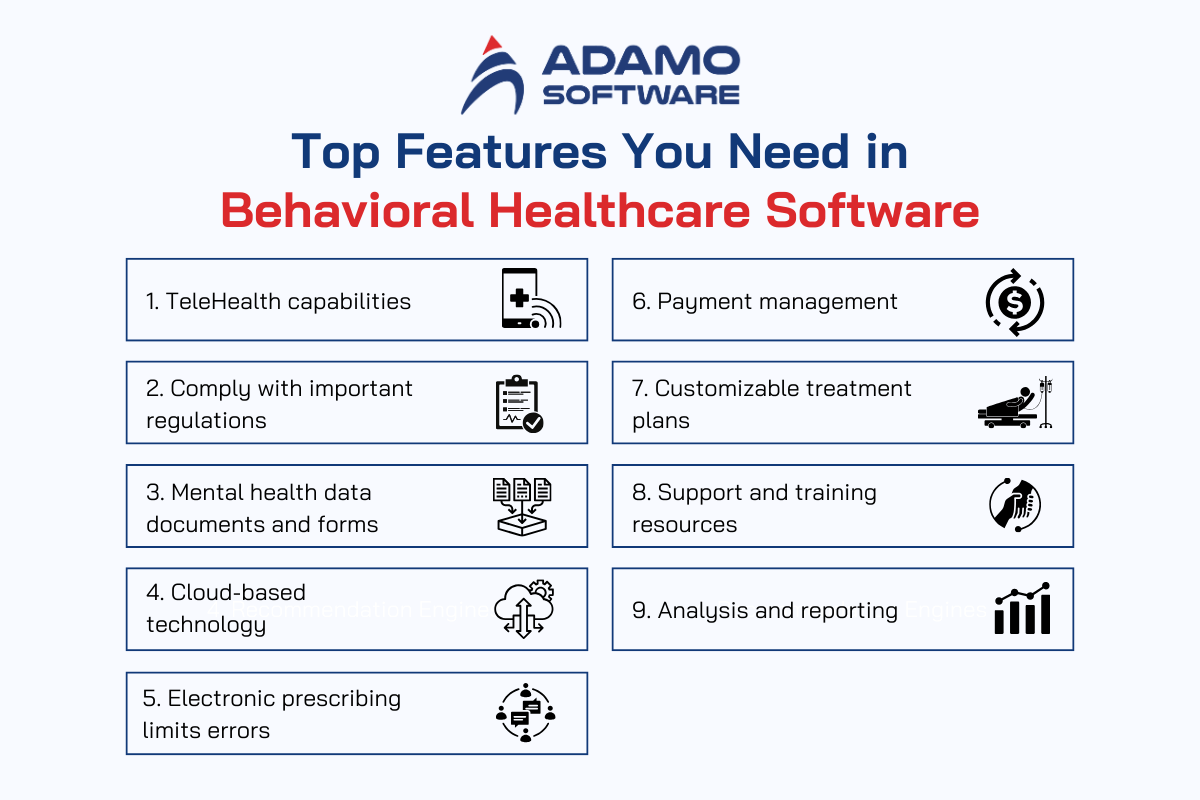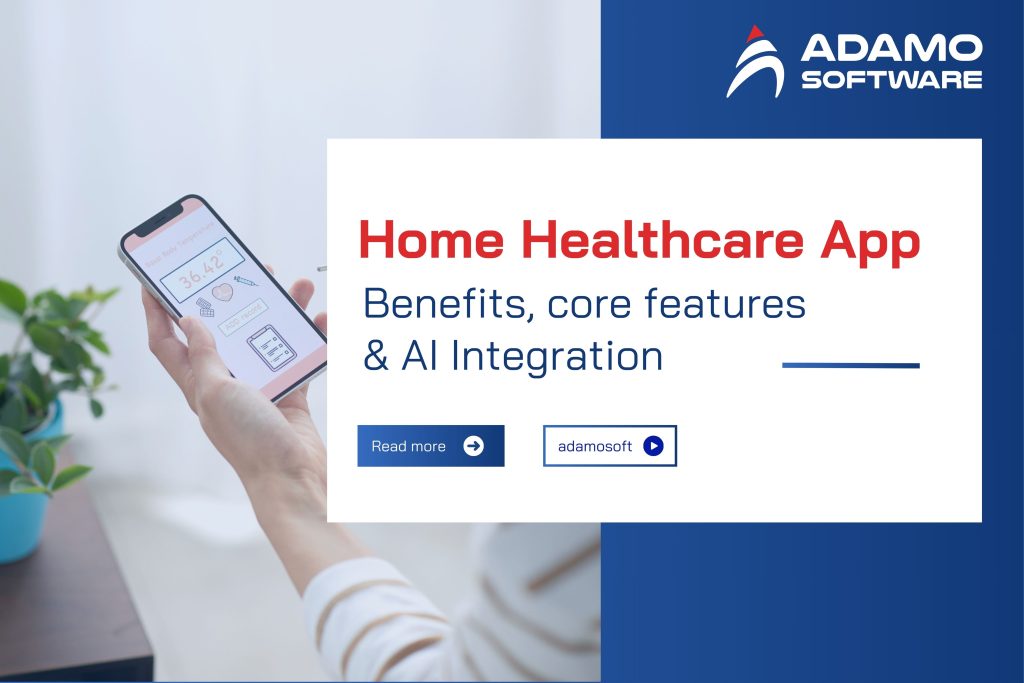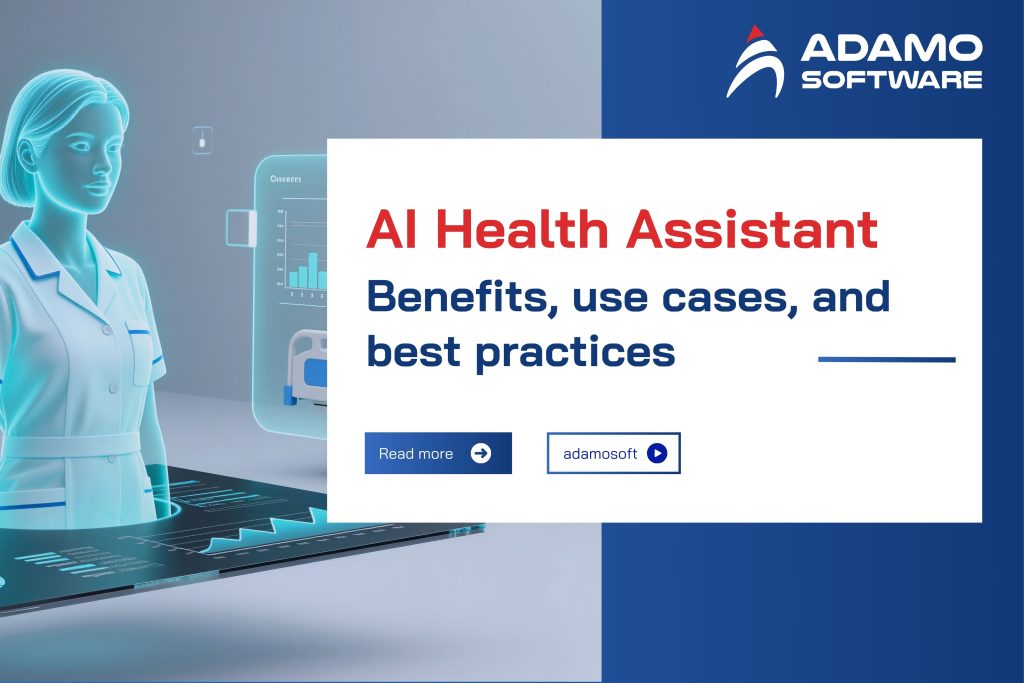9 Must-have Features of Behavioral Healthcare Software

Behavioral healthcare software is essential for managing patient care, streamlining operations, and ensuring compliance with regulations in the mental health field. As the demand for mental health services continues to grow, having the right software features is crucial to delivering high-quality care efficiently.
In this blog, we’ll explore the nine must-have features that can enhance your behavioral healthcare software, from patient management tools to data security measures. Understanding these features will help you choose the best software to meet your practice’s needs.
I. Insight into Behavioral Healthcare EHR Market
The US behavioral health EHR market is projected to grow from a 2021 valuation of $176.2 million. This will be significantly higher by 2030, at a compound annual growth rate (CAGR) of 11.07%.
This growth is being driven by increasing awareness among mental health professionals of the benefits of electronic health records (EHRs). A long with government initiatives aimed at boosting the adoption of healthcare IT in clinical settings.
Modern EHR software allows physicians to go beyond simply maintaining patient records. It supports telehealth, e-prescriptions, clinical assessments, and other administrative functions. These capabilities, combined with the rising demand for specialized mental health services, are propelling market growth.
Additionally, the market is being fueled by increased funding for new initiatives. For instance, in May 2020, Health Catalyst Capital (HCC) and Optum Ventures led a $21.5 million Series A funding round for Holmusk.
The incidence of mental illness in the United States has been on a consistent upward trend in recent years. Factors contributing to widespread mental health issues include work stress, unhealthy lifestyles, the COVID-19 pandemic, grief, and substance abuse. Researchers at Johns Hopkins University School of Medicine have found that one in four adults suffers from a mental illness.
Moreover, 18% of the U.S. population experiences an anxiety disorder. The Anxiety and Depression Association of America reports that around 19 million adults in the United States have a specific phobia.
Approximately 2.2 million people in the United States are affected by Obsessive-Compulsive Disorder (OCD). As a result, an increasing number of individuals are seeking mental and behavioral health services, which bodes well for the industry.
Emerging technologies are also aiming to enhance the efficiency of tracking time spent with each patient. The mental toll of moving from patient to patient can be challenging for clinicians. After a long day of providing care, healthcare providers often find it difficult to catch up on missed documentation.
Incorporating a well-designed EHR documentation tool into your existing workflow can help address this issue. Scribble, developed by IKS Health, is an EHR documentation tool that delivers comprehensive documentation of a patient’s case with minimal mental strain.
II. Why Develop a Custom Behavioral Healthcare Software
Before the COVID-19 pandemic, the United States had already been experiencing a rise in mental health issues. There are 19% of adults suffering from mental illness in 2018, an increase of 1.5 million individuals compared to the previous year. By 2020, anxiety screenings had surged by 93%, and depression screenings had increased by 62%. Given that suicide is the second leading cause of death, it is crucial to have staff well-versed in behavioral health procedures and protocols.
Behavioral healthcare software can ensure the safe discharge, transition, and follow-up of patients at risk. Providing excellent patient care is a primary objective that healthcare providers aim to achieve. However, daily routines, heavy caseloads, and billing complications can interfere, leading to a decline in overall facility quality.
Thus, the development of behavioral healthcare software is vital in the healthcare sector.
Here are several ways this solution accomplishes that:
- It streamlines staff workflows by minimizing human errors, eliminating duplicate data entries, and offering easy-to-understand templates for much quicker paperwork.
- Behavioral healthcare software enhances patient outcomes by giving physicians easier access to data. It enables them to make more informed decisions that are crucial for subsequent treatment.
- EHRs include treatment plans, clinical data, previous medications, and electronic prescriptions that are readily accessible to the necessary staff.
- They can also be used to analyze staff performance and patient information, generate reports, and share them with other healthcare providers as needed.
- An EHR system assists mental health operations in complying with local regulations and policies, preparing the organization for potential inspections.
III. Top Features You Need in Behavioral Healthcare Software
When choosing behavioral healthcare software, certain features are essential for optimizing patient care and streamlining operations. This section explores the top features that make your practice more effective and patient-centered.

1. TeleHealth capabilities
The COVID-19 infection has put the global population under stress. We find that direct medical care is not always possible. This is having an ongoing negative impact on behavioral health patients. To meet with patients even during lockdowns and shelter-in-place orders, BH professionals have begun using behavioral healthcare software to conduct online patient meetings.
Telehealth sessions are growing rapidly. Your behavioral health EHR must host these virtual sessions to keep staff and patients healthy during outbreaks.
Another thing the pandemic causes is high levels of stress in the population that will have a lasting effect. The ability to integrate telehealth devices that can monitor heart rate, and other physiological parameters can help healthcare professionals better understand a patient’s mental state.
2. Comply with important regulations
In the sensitive field of medical health, compliance with information security is critical to the trust and safety of the patient-service provider relationship. Behavioral healthcare software must comply with strict healthcare regulations, possess strong security features, and receive regular updates and support. For example, you might send patients for hypertension or diabetes tests. About 65% of BH patients have chronic conditions requiring concurrent care.
There is always the possibility that you will refer a BH patient to a neurologist or an internist. The behavioral healthcare software must meet HL7 standards. HL7, or Health Level Seven International, is a globally recognized standard for maintaining security while exchanging patient data.
– Comply with health care regulations
Compliance with healthcare regulations is of utmost importance for any Behavioral healthcare software. This compliance ensures the protection of patient privacy and the security of their health information. It involves implementing strict protocols for processing, storing, and sharing data.
Healthcare providers must ensure that their software complies with these regulations, protecting them from legal consequences and maintaining patient trust.
– Strong security features
Protecting sensitive patient data from breaches is paramount in the digital age. Behavioral healthcare software must have strong security features such as end-to-end encryption, secure login processes, and firewalls.
These measures help prevent unauthorized access and data breaches, which can have serious consequences for patients and providers. The software must also have mechanisms to detect and respond to potential security threats to keep patient data safe.
– Regular updates and support
The digital landscape is constantly evolving and with it the threats and challenges associated with it. Regular software updates are important to address new security vulnerabilities and enhance functionality.
These updates and reliable customer support ensure that the software stays compliant with the latest healthcare regulations and security standards. Healthcare providers should seek software vendors that offer consistent support. They should also provide proactive updates. This ensures the software remains reliable and safe in health service delivery.
3. Mental health data documents and forms
There is a lot that goes into creating documents and records for an individual, from the patient’s condition to medications, prescriptions, and more. And things become even more specialized when it comes to mental illness.
There are certainly differences between the types of information you provide to a psychiatrist and the forms you have to fill out for any other type of medical problem.
To collect adequate data, the system must provide a form. This form should include questions about the type of addiction, age of use initiation, and consumption.
These are just some of the things a mental health care provider must take into account before being able to better manage medications.
Your team must be meticulous about the documentation it creates, updates, and stores for each patient. Therefore, your software should certainly include appropriate fields for behavioral health data for use by third-party providers and certification agencies in their assessments of service delivery. Your health and its operations.
There will be differences in the type of data and documentation you must provide to a psychiatrist compared to forms required by a community treatment facility or psychosocial rehabilitation specialist.
4. Cloud-based technology
Patient information should always be accessible to different providers as needed. To be able to complete such a task, cloud storage technology is essential.
As we mentioned before, traditional paper records are a thing of the past and can be easily tampered with or destroyed over time. And although electronic health records provide a digital solution to this problem, those records are still stored on a hard drive somewhere.
Being able to store it on virtual cloud servers adds another level of security to patient data. It also helps manage information when exchanging information with other departments or healthcare providers.
5. Electronic prescribing limits errors
Electronic prescribing is the ability for a doctor to send an error-free and easy-to-understand electronic prescription to the pharmacy. The reality of digital prescriptions is that they cannot be tampered with in any way, and they optimize the pharmacy’s prescription intake process.
Meanwhile, the old way is for patients to get a note from the doctor and bring it to the pharmacy, then they have to wait for the prescription to be filled.
Instead, having doctors be able to approve prescriptions online could speed up the entire process. Using electronic prescriptions also limits the number of prescribing errors because the system can track any discrepancies and maintain all regulatory standards.
6. Payment management
Paying attention to the financial aspects of medical operations is of course important and demanding, especially for small medical facilities with fewer employees. Furthermore, healthcare professionals should not be well-versed in financial operations.
When it comes to mental health, having to deal with bills is one of the last things on a patient’s or doctor’s mind at the time. That’s exactly why having an EHR system with integrated billing capabilities can greatly assist behavioral health professionals in providing patient care.
Using an EHR system that is also a virtual patient portal simplifies the entire process. Such billing integration can be of great assistance with authorization, insurance verification, and handling claims. This means the medical practitioner does not have to deal with these tasks directly.
In turn, process optimization and patient outcomes improve as physicians can focus more on patient care.
Purchased “as-is” behavioral healthcare software does not meet the individual needs and criteria of patients or the mental health services your organization seeks to provide.
7. Customizable treatment plans
Flexibility in customizing treatment plans is a must in behavioral healthcare software. Mental health and substance use disorders vary from individual to individual, requiring individualized treatment approaches.
Customizable treatment plans allow medical providers to tailor their approach to each patient’s specific condition, preferences, and treatment goals. This customization ranges from adjusting medication dosages to combining different therapeutic modalities, ensuring that each patient receives the care best suited to their unique health condition.
8. Support and training resources
Implementing and training proficiently in behavioral healthcare software depends on the solution of comprehensive training resources and ongoing support. Healthcare providers must have access to training that covers both the technical and clinical aspects of the software.
This training course will equip users with the necessary knowledge and skills to operate the system effectively and enter data accurately. It will also help them take advantage of software features to enhance customer service and patient care. Additionally, training must be ongoing, adapting to evolving employee needs and software upgrades.
Equally important is the provision of ongoing support and maintenance. Healthcare providers must have access to a support team at all times, capable of resolving any technical issues quickly and efficiently.
Regular maintenance and troubleshooting support ensures that the software stays functional, up-to-date, and relevant to the changing direction of behavioral health care. This combination of comprehensive training and strong support is critical to optimizing the benefits of Behavioral healthcare software in any healthcare setting.
9. Analysis and reporting
Produces reports and analytics on clinical outcomes, treatment effectiveness, and population health trends. Offers insights to aid in quality improvement efforts, outcome evaluation, and evidence-based practices within behavioral healthcare software.
To meet auditing and compliance requirements easily and efficiently, system partners and vendors for reporting and analytics capabilities enable you to create comprehensive reports as needed. This not only helps you manage your business performance but also allows you to exploit the data in your system to provide effective customer care direction.
Also read: 15 Must-have Features of Home Healthcare Software
IV. How to Choose the Best Behavioral Healthcare Software Development Company
Mental health software companies are significant. As demand for mental health services grows and awareness increases, these companies provide essential tools to enhance care delivery.
Here are 5 key factors to consider when choosing the best behavioral healthcare software development company:

1. Specialization in Mental Health
It’s essential to choose a software company that specializes in meeting the distinct needs of mental health professionals. This focus goes beyond standard healthcare software, targeting the specific demands of behavioral health, substance abuse treatment, and therapy services. Seek out companies that provide specialized behavioral health EHR (Electronic Health Record) and practice management software. These tailored solutions often include therapy notes, patient scheduling, and charts designed specifically for mental health practices.
2. User-Friendly Interface
A user-friendly interface is crucial for any mental health software. Your team, which may include therapists, counselors, social workers, and health coaches, should find the software easy to navigate. A complicated or unclear interface can lead to frustration and mistakes in documentation. Check user reviews and get feedback from your team to ensure the software is intuitive and easy to use. This will help your staff understand and adopt the software more effectively, ultimately enhancing the quality of care you provide.
3. Comprehensive Support and Training
The level of customer support and training provided by a mental health software company can greatly influence your experience. Look for a company that offers strong customer support, including access to a dedicated support team and troubleshooting resources. Also, ask about the availability of training programs and materials. A company that prioritizes training ensures that your team can fully utilize the software and adapt to updates or changes easily.
4. Integration Capabilities
Integration is crucial in today’s healthcare environment. Your mental health software should be able to integrate with other systems and services you use, such as EHRs, billing software, and lab results. An integrated system saves time, improves data accuracy, and ensures a smooth flow of information. It also enhances revenue cycle management, allowing you to concentrate more on patient care than administrative tasks.
5. Data Security and Compliance
Protecting patient data is very important in healthcare. When choosing a mental health software provider, inquire about their commitment to data security and adherence to industry regulations like HIPAA. Ensure the software includes secure messaging features for communication with patients and other providers. All while maintaining compliance with data security standards. A certified solution that meets industry requirements offers peace of mind and builds trust with your patients.
V. Adamo is Your Trusted Behavioral Healthcare Software Partner
Adamo Software is your trusted partner for all your behavioral healthcare software needs. With years of experience in healthcare software development, we have a deep understanding of the unique challenges and requirements of the behavioral health sector.

Our team specializes in creating customized software solutions designed to enhance patient care, streamline administrative processes, and secure sensitive data.
At Adamo, we don’t just develop software; we build partnerships, working closely with our clients to deliver technology that truly makes a difference. By choosing Adamo, you’re investing in innovative, reliable, and scalable solutions that elevate the standard of care in behavioral health.
If you require advanced tools to enhance patient care, streamline administrative processes, or safeguard sensitive data, Adamo has the ideal solution. Let’s work together to raise the standard of healthcare with innovative technology.
VI. Behavioral Healthcare Software – FAQs
1. What is behavioral healthcare software?
Behavioral healthcare software helps manage, track, and analyze patient data. It improves the care and treatment process. Common features include appointment scheduling, patient records, and reporting tools. It may also integrate with other systems for better efficiency.
2. Is this behavioral healthcare software suitable for small practices?
Yes, the software is designed to suit both large and small practices. Smaller versions are cost-effective and user-friendly. They offer essential tools for managing and caring for patients. Features can be expanded as the practice grows.
3. Can this behavioral healthcare software integrate with other systems?
Behavioral healthcare software typically supports integration with hospital and clinic management systems. This allows for data synchronization and improved management efficiency. Integration also facilitates the transfer of information between departments. Compatibility should be checked before implementation.
4. Does this software require special training?
The software usually comes with user manuals and basic training resources. Many providers offer online training courses as well. Training helps staff become familiar with features and optimize usage. The extent of training depends on the software’s complexity.
5. What are the benefits of behavioral healthcare software?
Behavioral healthcare software offers numerous benefits, including enhanced patient care through detailed data and personalized treatment plans. It improves operational efficiency by streamlining tasks such as scheduling and billing. Robust security features ensure patient data protection, while seamless integration with other systems facilitates better care coordination. Additionally, powerful analytics tools provide valuable insights to support informed decision-making.





